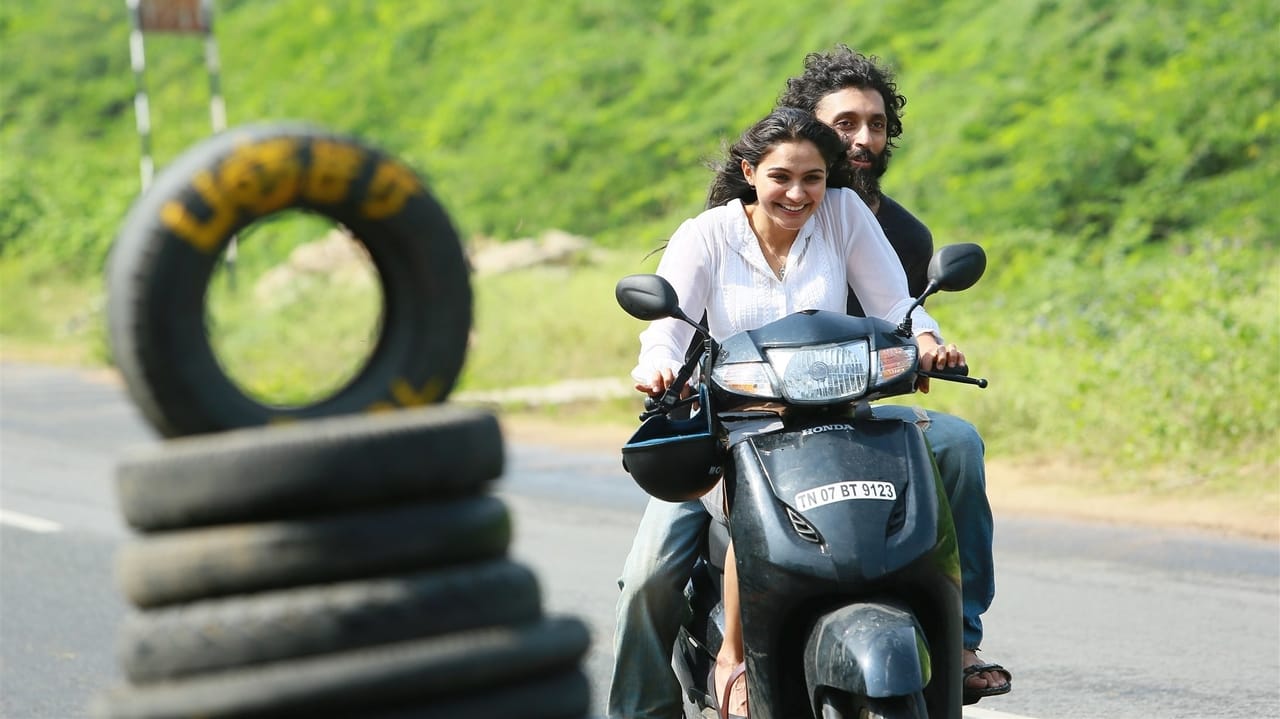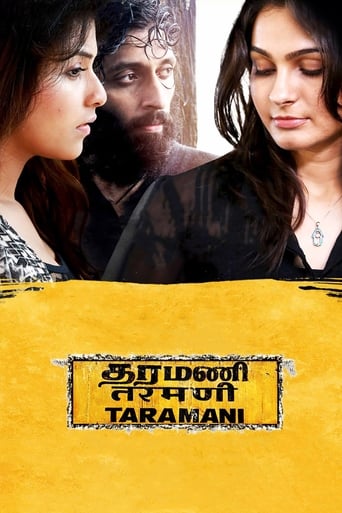

I am a fan of "Ram" and his creations and had loved Katradhu Tamizh despite it's disturbing content. But I rate "Taramani" the best that he has created by far. Would have loved it if he had kept off the voice overs. Showcased the performer in Andrea Jeremiah. And as usual Azhagan perumal shines in his role. Kudos to Vasanth Ravi; for a debut he has shouldered a very challenging role and has done quiet well, but has a long way to burnish the actor in him.Very moved by how well the movie touched upon a wide array of social & environmental issues.Looking forward to Ram's next gift..
... View MoreRam's "Taramani" doesn't exactly have a new story to tell: in fact, it's the most told tale in the history of cinema..the depth of relationships between the male and the female gender. "Taramani" feels more like a series of incidents than a narrative with proper beginning and closure..but this is definitely in a good sense.Andrea plays an Anglo-Indian single mom who works as an HR manager in an I.T conglomerate while Vasanth Ravi (in his debut) plays a frustrated call-center employee with a rural background. Both performances are in good hands but Andrea has done a sensational job in portraying her character Althea in a highly-convincing manner. She is bold as hell, responds slyly to remarks made on her body, smokes, goes out partying, wears short skirts and does pretty much everything a typical Indian woman is not "expected" to do. Ravi's Prabhunath is a woman-hater primarily because he was dumped earlier (by Sowmya, played by Anjali in a guest appearance) by someone he put complete faith in. When these two contrasting personalities collide, the results are mighty exciting. Prabhunath's relationship with Althea's son Adrian is what initially binds them together but things soon get out-of- hand. Prabhu's misogynist side takes over and he starts to get overly suspicious of Althea's relationships with other men and questions her on several occasions, much to her dismay. These portions are written and acted well; the dialogues are especially good - a clear indication on how good an observer writer/director Ram is. Although the practicality of the proceedings remain dubious (such as Althea letting someone move in with her so quick, Adrian's grandmom telling him that his mother is a b*tch and so on), director Ram tries to enliven such bits with his own voice-overs which carry the harmless yet relatable vibe of a radio-jockey (he refers to those as his timely 'status updates'). Yet, with everything that you see unfold on screen, even with the backing of an above-par Yuvan score, something does feel amiss. Certain segments are just too random to be treated seriously. Like Althea's composed reaction when she gets to know of her husband's sexual orientation, or her decision to spend a night at a train station instead of a hotel, or Prabhu's rather hasty decision to seduce/blackmail married women and such and such. If there's one thing that you gotta love about "Taramani", it's the way in which Ram has woven a stretch of incidents almost completely revolving around the two leads and yet manages to retain viewer attention throughout. Sreekar Prasad's uncluttered editing makes sure there are a bunch of stand-out portions. Director Ram is a sure-shot advocate for the "live and let live" motto but seems to relish addressing issues from the female standpoint, a bit more. Both Althea and Sowmya tell Prabhunath (on different occasions) that they loved him because he was the only genuinely kind-hearted member of the male gender they'd known. Whatever happened to all the 'good men' in movies that love propagating equal honor for genders. The quintessential happy-ending seems forced, but as Ram narrates in his voice-over "Not every WHY needs to be answered" I suppose. The randomness of it all is actually why I enjoyed watching "Taramani".Verdict: Worth seeing for Andrea's strong depiction of the urban Tamil female!
... View MoreThe spots were intelligently placed. At the beginning of the movie, there is a shot of two parts of the city; one very poor & the other is the corporate world. The Taramani station is at the center, separating both these two worlds. It's interesting that when the first meet, they meet at the station because Ram apparently wants to tell us that these two worlds meet. The progression of the story is sort of a class difference. The story took various unexpected turns, but the flow of the movie wasn't steady, but more random."Feminism" is seasoned all over the movie. Every man in the movie is dumb, unfaithful, & terrible. That's how men are portrayed in the entire movie, which is basically man hating & therefore, a feministic movie! Since smoking & drinking is a virtuous thing for a society, Ram fights for women by telling us how the society is terribly guilty of not giving this virtuous privilege to women..Anti-capitalist message is all over the movie again. At the beginning of the movie, there's a shot where the hammer & sickle flag is flying high. When Andrea is fired in the movie, somehow Ram thought it was very important to whine about how great labor unions are & how the capitalist system mistreats workers & that's obviously not true.
... View MoreDirector Ram prefaces Taramani as a knot of unconnected events and so may be meaningless. (மொட்டைத் தலைக்கும் முழங்காலுக்கும் முடிச்சு). The film gets into extremes of almost everything. It portrays the relationship of a street dweller with an upper middle class single mother. It tries to portrays the lights of feminism amidst societal norms. Money gets drawn parallel to honesty. Opportunism is brought in against sincerity. Globalisation versus anti-globalization and self sufficiency. It is a kind of overkill and problem gets widened just because everything is a conflict. Everything gets pardoned and forgiven and you are at peace.A popular phrase in literary appreciation is "Let the story travel by itself. Let the characters speak!". The problem with Ram's films is; he will be seen throughout the film. It's not just traces, sometimes he gets over the top. In Taramani, he himself acknowledges that and passes on comments and directs the audience (he compares this with Facebook\twitter status messages). If the director of a film in its course comments at the response of audience like "If you haven't questioned globalization, don't question this character!", it is indeed an insult to the audience. If an insult is Ram's primary intention, it is fine. If he aims at questioning the (globalization) ideology of viewers, then he should revisit his theories of a creative art. The experience of Taramani gets established in the preface itself. We will have to experience a satsang or gospel (or a bit of both since the protagonist is an Anglo Indian) except for the fact that you are force fed with life lessons than religious lessons.A feminist should live on her own. A cliché from Balachander days is also taken over in Taramani. Feminism has been treated differently in the past two decades. We have seen Kalyana Agathigal, Magalir mattum, Marupadiyum, 16 vayathinile etc. There is a subtle difference between feminism and misandry. Unfortunately all the feminist films try to portray hatred for men rather than feminism. If you are a woman and earn 80K/month; man is dependent on you and on a tussle if you can throw him out of the house (saying I am feeding you), what is the kind of feminism you are trying to disclose? You just go on and prove that the control or fight over couples should be mostly on financial front. There is an interesting character in Taramani; a cop's wife. She gets ill treated by her husband. She tries to get over the trauma via books. She reads "Asuran" which is all about injustice to a totem. So, even literally, you are not getting over the hatred.The urban globalized world is in a transformation. You get confused with a lot of principles. The protagonist's friend goes to a pub, dances with other men when her husband watches her dancing. The friend says, you just have to throw biscuits at these dogs at the right time. There is a higher class lady, who wants to sleep with a stranger, loses her wedding ring. She sleeps with the police commissioner for getting the ring back! It's all Ram Ram!! No character gets committed to a relationship. In the idea of breaking the stereotypes, all the goodness in the conventional wisdom gets totally erased. In that sense, it is a regressive movie to the larger extent. Taramani is verbally angry at urbanization and birds losing their habitat. Taramani tries to bring out negative shades of urban lives and their insecurities. Taramani disguises itself as a feminist art. Those said and done, dialogues stand out and are emotional. Andrea's best performance till date. Barnabas and his forgiveness add the grace and ray of hope. Though it may seem as a film for matured audience, Taramani just tries to tie a knot between extremes of unconnected entities; which for all its practical difficulties is very rare. Taramani is just a gooey film with a confused core!
... View More